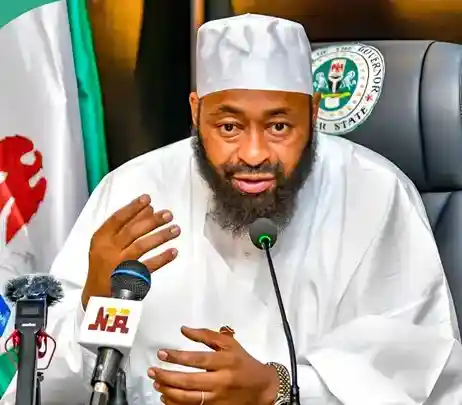Nigerian Governor Orders All Preachers To Submit Sermons for Approval
Advertisements
In a move that has stirred public debate, Governor Umar Mohammed Bago of Niger State has declared it compulsory for preachers in the state to submit their religious sermons for government approval before delivery. The directive applies to Islamic clerics and other religious leaders who deliver messages to congregations across the state.
TJ News Nigeria reports that the governor clarified the order during a televised appearance on TVC’s Politics on Sunday on September 14, 2025, stating that the regulation is aimed at curbing indoctrination and ensuring that messages delivered in mosques, churches, and other religious platforms do not threaten peace, security, or the unity of the state.

- FG Gazettes New Tax Reform Laws: Key Changes Nigerians Must Know
- Full List of All 28 Commercial Banks in Nigeria, 2 Set To Shut Down
Governor Bago’s Directive
Speaking on the program, Governor Bago defended the new law which requires religious leaders to present their Friday sermons and other messages for review by designated authorities.
Advertisements
His words:
“I didn’t ban evangelism… For everyone going to sermon on Friday, he should bring his scriptures for review, and it’s normal. Even in Saudi Arabia, this is done. We cannot say because you have been given the opportunity to be a cleric, you will go out and preach the gospel that is anti-people, anti-government and you think it’s normal.”
The governor stressed that while freedom of religion is guaranteed, sermons must be checked to avoid inciting messages, hate speech, or content that could radicalize the population.
Collaboration With Security Agencies
Governor Bago disclosed that the screening of sermons would not be handled by the state government alone but in partnership with key security agencies.
Advertisements
- Department of State Services (DSS)
- Nigeria Police Force
- Nigeria Security and Civil Defence Corps (NSCDC)
- Military authorities
According to the governor, this collaboration will ensure that messages are monitored for content that may be considered anti-people or anti-government.
Concern About Indoctrination
The Niger State governor justified the move as a measure taken out of fear of indoctrination. He explained that unchecked preaching has the potential to spread extremist ideologies, create division, and compromise security.
He emphasized:
Advertisements
“We want to be able to see what they are preaching, hear what they are saying. We are working together with security agencies… and all preachers must comply.”
Religious License Requirement
The sermon approval order follows an earlier directive by the Niger State government requiring all preachers engaging in public preaching to obtain a license within a two-month window.
This licensing regime, officials say, is part of a broader effort to regulate religious preaching in the state and maintain order.
Reactions From Religious Leaders
The policy has drawn mixed reactions from religious leaders and groups within Niger State.
Advertisements
- Bashir Yankuzo, chief imam of the Federal University of Technology, Niger State, acknowledged the government’s security concerns but cautioned that implementation should respect freedom of worship.
- Raphael Opawoye, secretary of the Christian Association of Nigeria (CAN) in Niger State, expressed reservations about government interference in religious practices, warning that it could set a dangerous precedent if not carefully managed.
Comparisons With Other States
Governor Bago’s directive is not the first time a Nigerian state has sought to regulate religious preaching.
- In Anambra State, Governor Charles Soludo banned loud preaching in marketplaces, citing noise pollution and public disturbance. Offenders risk fines of up to ₦500,000.
- Several northern states with histories of religious extremism have also introduced measures to monitor and license preachers.
Proponents argue that such regulations are necessary to curb hate speech and extremist ideologies, while critics see them as infringements on religious freedom.
Implications for Religious Freedom
The Niger State directive raises questions about the balance between national security and constitutional rights.
Advertisements
Possible Benefits:
- Helps prevent incitement and radical preaching.
- Strengthens collaboration between government and religious institutions.
- Reduces the spread of misinformation cloaked as religious teaching.
Possible Concerns:
- May be perceived as government overreach into religious affairs.
- Risk of selective enforcement, targeting certain groups.
- Potential to ignite political and religious tensions if not handled with transparency.
Nigeria’s Security Context
The policy comes at a time when Nigeria continues to battle insurgency, banditry, and kidnapping across several regions. Extremist ideologies, spread in part through unchecked preaching, have been identified as a factor fueling insecurity.
By seeking to regulate sermons, the Niger State government aims to ensure that religious platforms do not become avenues for promoting divisive or anti-state rhetoric.
National Political Reaction
While some observers view the move as a security necessity, opposition voices within the political space have warned that excessive regulation could be weaponized to silence dissenting voices, including clerics critical of government policies.
The All Progressives Congress (APC) administration in Niger State, however, maintains that the order is in line with best global practices, pointing to Saudi Arabia and other countries where religious sermons are subject to state oversight.
Editorial Commentary
Governor Umar Bago’s order making it compulsory for preachers to submit sermons for approval in Niger State has sparked conversations across Nigeria. Supporters argue it is a necessary step to curb indoctrination and safeguard peace, while critics fear it may infringe on religious liberty and freedom of expression.
As the policy is rolled out with the backing of security agencies, its implementation and reception will likely determine whether it strengthens public order or provokes further controversy in an already sensitive area of governance.
Advertisements

